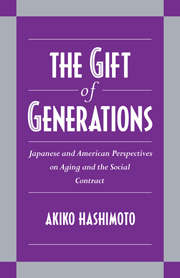Book contents
- Frontmatter
- Contents
- List of Tables and Figure
- Preface
- Acknowledgments
- 1 The Social Designation of Deserving Citizens
- 2 Two Communities, Two Societies
- 3 Rights and Responsibilities in the Public Domain
- 4 The Practice of Protection and Intervention in the Private Domain
- 5 The Japanese Viewpoint
- 6 The American Viewpoint
- 7 Cultural Assumptions and Values
- 8 The Social Regulation of Interests
- 9 Conclusion
- Appendix: Methods of Research
- Bibliography
- Index
1 - The Social Designation of Deserving Citizens
Published online by Cambridge University Press: 03 February 2010
- Frontmatter
- Contents
- List of Tables and Figure
- Preface
- Acknowledgments
- 1 The Social Designation of Deserving Citizens
- 2 Two Communities, Two Societies
- 3 Rights and Responsibilities in the Public Domain
- 4 The Practice of Protection and Intervention in the Private Domain
- 5 The Japanese Viewpoint
- 6 The American Viewpoint
- 7 Cultural Assumptions and Values
- 8 The Social Regulation of Interests
- 9 Conclusion
- Appendix: Methods of Research
- Bibliography
- Index
Summary
THE PRIVATE DISCOURSE: EXPECTATIONS OF VULNERABILITY
Dorothy Turoski is a 74-year-old woman who lives in a public housing complex for the elderly in the city of West Haven, Connecticut, 80 miles to the northeast of metropolitan New York. She packed chicken at the local poultry factory for 28 years before retiring from her job, and now lives in a subsidized one-room housing unit of this complex on a small Social Security income. Dorothy has some difficulty moving around because of arthritis, and she has lived here alone for 7 years.
I do nothing. There's nothing to do here. I haven't got none, no friends. There's plenty of days I don't see anybody. I don't know anybody here. I don't go to City Hall [senior center], I don't know anybody here. …
My husband died. My two daughters died. My son had a stroke. He is paralyzed. He's in a wheelchair. For three and a half years, I was away taking care of my daughter. I used to go at eight o'clock till four when the kids came home from school. When she died, it seemed that everything in me died. Because I didn't care anymore. She suffered so much. … I got all her children, but they're not very nice. They don't come to see me or anything.
On a Sunday, the parking lot is full when they come to see their grandmother or their mother, but there's nobody there for me. … […]
- Type
- Chapter
- Information
- The Gift of GenerationsJapanese and American Perspectives on Aging and the Social Contract, pp. 1 - 17Publisher: Cambridge University PressPrint publication year: 1996

